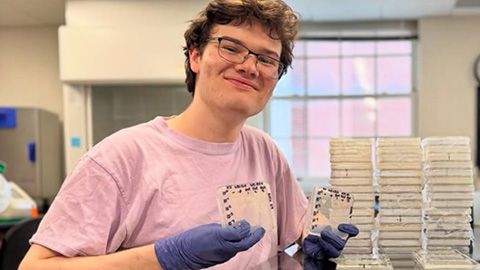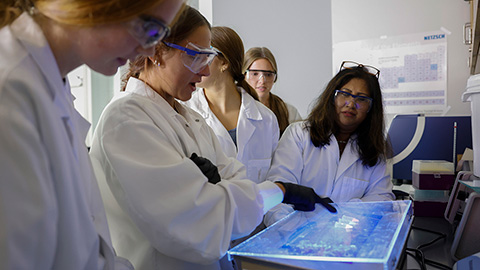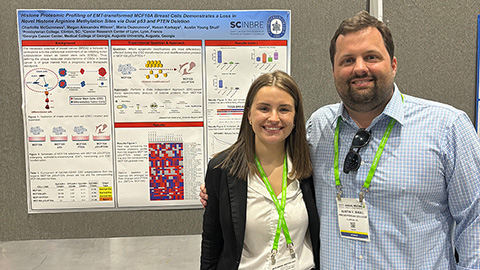Overcoming the grad school slump
Graduate school is a long haul. In the U.S., doctoral degrees in the life sciences take over five years to earn on average, according to the National Science Foundation’s Survey of Earned Doctorates.
As we move toward the downward slope of summer, many grad students are transitioning into that next year of work. For some, this means finally starting dissertation writing with an end in sight. For others, it means being done with class commitments and being able to focus solely on research. And for still others, it means entering into another year of research much like the last year, without a graduation date looming as promise at the end.
Every year of grad school brings a different experience and flavor, and for many of the grad students I’ve known at least one of those years has been a slump.

What do I mean by slump? For me, it was a noticeable change in focus and drive compared with previous years and it came around my third to fourth year. At that point, I had finished my core coursework, passed my qualifying exams, and had almost a year of focused research under my belt.
I felt like I had been making some progress, but it was slow. Graduation was nowhere in sight. Experiments started going wrong. I was still doing poster presentations at conferences and wasn’t getting spots for talks or presentations. Without classes, there weren’t even small milestones that felt like achievements (not that I ever want to have to take exams again).
Basically, I felt like I was in a hamster wheel — I knew I was doing work, but I didn’t feel like I was getting anywhere. I felt less passionate about my projects, and the idea of trudging along for another two-plus years to get to graduation seemed daunting.
Spoiler: I did end up graduating and working through the slump. It may sound cliché, but I don’t think there was any one thing I did to pull myself through my slump. Several small changes helped. They might help you too.
First, I recommend meeting with your mentor or thesis committee to discuss your progress. My slump era felt so directionless partially because I went a long time without a committee meeting and my project changed a few times, making me feel like I just wasn’t moving forward. If you feel like your current project may not be bringing you closer to graduation, talking with your mentor may give you a clearer picture of the long-term goals you’re working toward. And while many may dread committee meetings, I found them a valuable way to take a step back and get feedback from those who weren’t wrapped up in the day-to-day of my research. Preparing my committee meeting presentations also served as a good reminder of all the work I had done, even if it didn’t feel fruitful.
Second, I recommend getting involved in activities outside of lab if you’re not already. For me, this was when I started becoming more engaged with my school’s student government organizations. I had been a part of the graduate student association for a year or two and decided to join the executive board. While it was more responsibility on top of lab work, it presented new challenges and gave me something to focus on other than my failed genetics experiment or frustrating instrument malfunctions. I was also able to meet new people and talk about things other than research. I felt like I was contributing something to the graduate school community at large, giving me a sense purpose beyond lab work.
Third, try to remember two things: that you’re not alone and that you are your own person. Many of the other grad students in my cohort also experienced some kind of stuck feeling. For me, it was helpful to realize I wasn’t the only one who was feeling frustrated or having doubts about my academic path. However, I also suffer from constantly comparing myself with others, and the old adage that comparison is the thief of joy rings true for me. If you’re feeling stuck, try not to look at what everyone else is doing and assume they’re doing better. Everyone’s grad school path is different, and success isn’t universally measured.
Lastly, I want to note that sometimes a slump is more than just a lull in research productivity or interest. If you feel like you’re generally down or aren’t coming out of that headspace, reach out to a doctor or therapist. Many schools have counseling centers that allow graduate students to have a certain number of free sessions each semester. It can be helpful to address your feelings with an outside (and professional) perspective.
Although inconvenient, time is sometimes the only way to come out of a slump. As I became more senior in the lab and got more responsibility, my day-to-day life changed, and these little shifts help push me into a new, more productive era of research compared with the previous year. Graduation became more of a reality, and the slump was gone.

Six more perspectives on getting over the Ph.D. hump
About half of doctoral scientists quit. In 2015, ASBMB Today wanted to know about the other half who made it through the slog. Six scientists shared words of wisdom. Read them here.
- "A Ph.D. is an asset, no matter what" by Ulli Hain
- "A cost–benefit analysis" by Nikolai Slavov
- "Writing through it" by Jen Grant
- "Small steps to a dream fulfilled" by Samarpita Sengupta
- "Science can be service" by Lynn Mirigian
- "A weight is lifted" by Rajendrani Mukhopadhyay
Enjoy reading ASBMB Today?
Become a member to receive the print edition four times a year and the digital edition monthly.
Learn moreFeatured jobs
from the ASBMB career center
Get the latest from ASBMB Today
Enter your email address, and we’ll send you a weekly email with recent articles, interviews and more.
Latest in Education
Education highlights or most popular articles

Summer research spotlight
The 2025 Undergraduate Research Award recipients share results and insights from their lab experiences.

Debugging my code and teaching with ChatGPT
AI tools like ChatGPT have changed the way an assistant professor teaches and does research. But, he asserts that real growth still comes from struggle, and educators must help students use AI wisely — as scaffolds, not shortcuts.

How AlphaFold transformed my classroom into a research lab
A high school science teacher reflects on how AI-integrated technologies help her students ponder realistic research questions with hands-on learning.

Writing with AI turns chaos into clarity
Associate professor shares how generative AI, used as a creative whiteboard, helps scientists refine ideas, structure complexity and sharpen clarity — transforming the messy process of discovery into compelling science writing.

How undergrad research catalyzes scientific careers
Undergraduate research doesn’t just teach lab skills, it transforms scientists. For Antonio Rivera and Julissa Cruz–Bautista, joining a lab became a turning point, fostering critical thinking, persistence and research identity.

Talk nerdy to me: Communicating research that matters
Master science communication: learn to engage the public, work with the press and explore new careers — from consulting to media — through ASBMB’s Art of Science Communication course.

